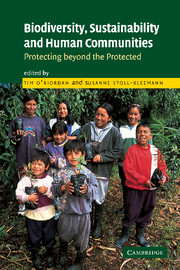Epilogue
Published online by Cambridge University Press: 22 September 2009
Summary
Maintaining the planet's biodiversity is an important societal goal. Meeting the needs and aspirations of a growing world population is also an important societal goal.If the steps needed to achieve these goals always coincided, and if society's goals dictated public and private actions, then there would be little need for this book. But neither of these conditions holds true. Development needs are often best met through actions that simplify biodiversity–agriculture being a case in point. And all too often societal goals are undermined by actions taken by the wealthy or powerful within government or the private sector to accrue more wealth or power.
As a result, we have less biodiversity today than we did in 1900 and we will have far less biodiversity in 2100 than we do today. Is this a catastrophe? From a utilitarian standpoint, probably not. The extinction of most species over the coming decades will have few practical consequences for human livelihoods. This is not to say that extinctions do not sometimes have serious ramifications. Chapter 1 shows that the ecosystem values of biodiversity can be considerable and could have major effects on future economies if lost to future generations. In general, the economic and social impacts of the hundreds of species that have gone extinct over the past century or thousands facing extinction today are still on the small side.
- Type
- Chapter
- Information
- Biodiversity, Sustainability and Human CommunitiesProtecting beyond the Protected, pp. 311 - 314Publisher: Cambridge University PressPrint publication year: 2002



